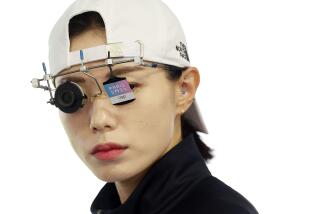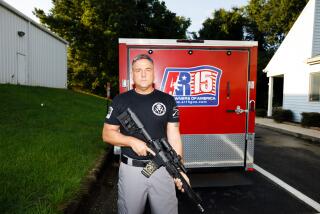Suddenly, She’s a Big Shot : Cindy Raahauge, 18, of Corona Makes a Rapid Rise to Upper Echelon of Skeet Shooting
- Share via
Cindy Raahauge is a shooting star, an 18-year-old American skeet shooter whose rapid ascent is the result of hard work, a lot of hours, monetary and moral support from her family, and fate. Make that two parts fate.
First, there was Dan Carlisle, a five-time national champion, opening his gun shop within Raahauge’s Hunting Club, owned by Cindy’s father, Mike. Then, there was the 1984 Olympics, with the Prado Tiro venue in Chino so crowded from actual competition that a handful of people headed to Raahauge’s place, a 2,500-acre complex nearby in Corona, to practice.
Cindy was nothing more than a recreational user of guns, but that little shoot-around brought some favorable reviews from the experts. Stick with it, they said. So she did.
“All of the sudden that’s all she wanted to do,” Mike Raahauge recalled.
Three years later, that’s still about all she wants to do, for there she is, again, hanging around the experts at Prado Tiro in this week’s 27th U.S. International Shooting Championships. But, Raahauge, one of the best in the country in skeet shooting, is one of them. And all this comes just three weeks after graduating from Corona High School.
The serious training started in February of 1986, when she began working with Carlisle, a bronze medalist at the 1984 Olympics in trap shooting and the only person to ever win American titles in skeet and bunker trap the same year. Raahauge was a C-class shooter from the start, (D-class is the lowest) and worked up to B within 2 1/2 months. Six weeks later, she finished sixth in a field of 12 at the U.S. championships, and the five women to beat her had all been competing for at least five years.
By May of 1987, she was in A-class, a status earned by hitting 90-91% of 200 clay-pigeon targets in a competition. Master is the final rung in the ladder, and that looms somewhere in the future. At this rate, probably the not-too-distant future.
“She can touch it, she just can’t put her fingers around it,” Carlisle said.
“She can be a world champion, possibly even an Olympic champion. She can be out there with that unit. She’s going to be one of the best skeet shooters to ever come from America if she keeps it up, which she will. She’s that type of person. She would sacrifice her freedom as a person to be a world champion.”
To prove it, Raahauge has enlisted, though she will hardly be regular Army. Beyond boot camp, a tour of duty with the U.S. Army Marksmanship Unit (USAMU) is an honor for the top shooters, and they must first send a resume, make all the qualifying scores and know the right people before being invited to join. The opportunity for subsidized training and coaching, travel around the world for competitions and few responsibilities beyond shooting--this is more polish than spit.
Raahauge skipped the senior prom in April to compete at Fort Benning, Ga., home of the USAMU, and came through with a 181, the highest score of her career at that point. That gave her a chance to see the base and a chance for the brass to see her.
“I’ll shoot five days a week,” she said. “That’s my job. I’m going to have an advantage over some of the other (non-Army) people. I’ll be traveling six months out of the year to compete. It’s always a competitive atmosphere, so they force you to get better.”
The Army has seen the Raahauge technique and attitude before. It came through last time with Carlisle, who spent seven years with the specialized unit.
“You can see it in their basic fundamentals,” said Burl Branham, the civilian coach of the USAMU and coach of the U.S. shotgun team at the ’84 Olympics. “I could recognize some of these attributes any time I see them. The way she holds the gun, the way she moves the gun. That’s him.”
She seems to have Carlisle-like potential, too.
“You’re not always right, but unless I miss my mark, she’s going to be a terrific shooter,” Branham said.
So close have Carlisle, 31, and Raahauge become as coach and student that they have taken to referring to each other as brother and sister. He passes down knowledge from 17 years of competition.
“Some of the things it took me 10 or 15 years to learn, she already knows,” Carlisle said.
“In order to be a shooter, you really have to be your own coach,” said Carlisle, who finds his time as a shooter being replaced more and more by that of a coach and consultant. “She’s almost in position to do that now with what I have taught her. When she’s in trouble, she can pull herself out. She can correct her own errors. That’s the problem with most people, that they’re not able to correct themselves when they go bad.”
Go bad? Cindy Raahauge is just starting to get good.
“There are still places to go and see,” she said. “Now, I think, I’m just beginning because I finally think I’m where I should be. But I still have a long way to go.”
More to Read
Go beyond the scoreboard
Get the latest on L.A.'s teams in the daily Sports Report newsletter.
You may occasionally receive promotional content from the Los Angeles Times.






